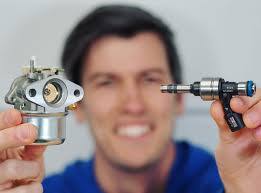
Difference in Carburetor vs Fuel Injection PowerSports Vehicles
Share
What's the difference between EFI (fuel injected) machines verses Machines with Carburetors
When it comes to PowerSports vehicles, one of the key considerations is the type of fuel delivery system they use. Two common options are carburetors and fuel injection. While both perform the same basic function of delivering fuel to the engine, there are significant differences between the two. In this article, we will explore the differences in carburetor vs fuel injection PowerSports vehicles.
Carburetor: The Classic Fuel Delivery System
Carburetors have been around for decades and were the go-to choice for fuel delivery in PowerSports vehicles for a long time. They work by mixing air and fuel in a chamber called the venturi, which then gets delivered to the engine. Carburetors are relatively simple in design and function, making them easier to maintain and repair. They are also less expensive compared to fuel injection systems. However, carburetors are less efficient in delivering fuel, especially at higher altitudes or in extreme weather conditions.
Fuel Injection: The Modern Solution
Fuel injection systems have gained popularity in recent years due to their increased efficiency and better control over fuel delivery. Instead of relying on the venturi principle, fuel injection systems use electronic sensors to measure air intake and engine conditions. This data is then used to precisely control the amount of fuel injected into the engine. Fuel injection provides better fuel atomization, resulting in improved combustion and power output. Additionally, fuel injection systems can adjust fuel delivery based on various factors like temperature, altitude, and engine load, ensuring optimal performance in all conditions.
Advantages of Fuel Injection
Fuel injection systems offer several advantages over carburetors:
- Better fuel efficiency: Fuel injection systems deliver fuel more efficiently, resulting in improved mileage. The precise control over fuel delivery ensures that the engine gets the right amount of fuel at all times.
- Enhanced performance: Fuel injection provides better throttle response and more consistent power delivery. The improved fuel atomization leads to better combustion, resulting in increased horsepower and torque.
- Reduced emissions: Fuel injection systems can be fine-tuned to reduce harmful emissions. This is achieved by optimizing the air-fuel mixture and utilizing additional components such as catalytic converters and oxygen sensors.
- Reliability: Fuel injection systems are less prone to fuel-related issues like vapor lock or flooding. They provide a consistent fuel supply, regardless of external conditions, ensuring smoother operation and reduced maintenance.
- Adaptability: Fuel injection systems can adjust fuel delivery based on various factors, ensuring optimal performance in different conditions. They can compensate for changes in altitude, temperature, and engine load, resulting in consistent performance across various terrains and weather conditions.
Advantages of Carburetors
While fuel injection systems have become the preferred choice, carburetors still have their advantages:
- Simplicity: Carburetors are relatively simple in design and function. They have fewer components compared to fuel injection systems, making them easier to understand, maintain, and repair.
- Cost-effective: Carburetors are generally less expensive to manufacture and install compared to fuel injection systems. This makes them a more budget-friendly option, especially for entry-level PowerSports vehicles.
- Compatibility: Carburetors can be easily retrofitted into older PowerSports vehicles that were originally equipped with carbureted engines. This allows owners to upgrade their vehicles without the need for extensive modifications.
Carburetor vs Fuel Injection: Which is Right for You?
The choice between carburetor and fuel injection depends on various factors, including personal preference, budget, and specific requirements. If you are looking for a simpler and more cost-effective option, a carburetor-equipped PowerSports vehicle may be suitable. Carburetors can be a good choice for recreational riders who prioritize ease of use and affordability. On the other hand, if you prioritize fuel efficiency, performance, and advanced control features, a fuel injection system would be the better choice. Fuel injection systems are ideal for riders who demand optimal power, responsiveness, and adaptability in their PowerSports vehicles.
Conclusion
As technology advances, fuel injection systems have become the preferred choice in PowerSports vehicles. They offer improved efficiency, performance, and reliability compared to carburetors. However, carburetors still have their advantages, especially for those who prefer simplicity and cost-effectiveness. Ultimately, the decision between carburetor and fuel injection comes down to personal preference and specific needs. It is important to consider factors such as budget, performance requirements, and the intended use of the PowerSports vehicle before making a decision.
